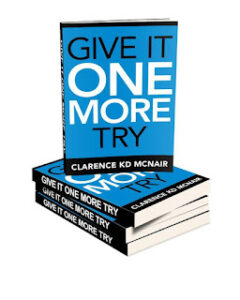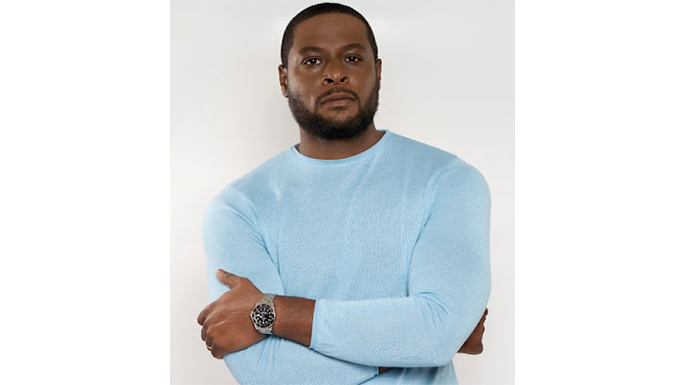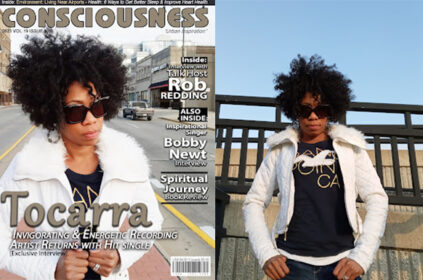Interviewed and written by Tocarra Eldridge @TocarraMusikworld

Recently I was granted the opportunity to interview veteran singer Clarence “KD” McNair, Jr. who was once a part of the R&B group, “Prophet Jones” that was signed to Motown Records. Some of the group’s hits include “Cry Together,” “Lifetime,” and “You Gotta Believe,” just to name several.
Recently KD McNair released a new book titled, “Give It One More Try” that is available in hardcover and paperback. The book is about McNair’s story of triumph and how he hit rock bottom after having a successful music career. It also talks about mental health and how McNair overcame anxiety disorders, hardships and much more.
Here is what Clarence “KD” McNair, Jr. has to share with the readers regarding his powerful and inspiring book.
Tocarra Eldridge: I want to thank you so much for taking the time out to interview with Consciousness Magazine.
Clarence McNair: Oh definitely! It’s an honor!
Tocarra: What is your inspiration behind writing the book “Give It One More Try”?
Clarence: Well, in my past I was signed to Motown Records. I was in a music group called Prophet Jones; it was an R&B group. The book was inspired by the events that took place after we lost our record deal in 2003. After we lost our record deal I started suffering from anxiety, started suffering from panic, and it was very challenging. The book was pretty much inspired from my journey and everything that I experienced while overcoming all of the obstacles and challenges that came my way. I felt in my heart that someone could benefit from all of my experiences after the music group.
Tocarra: For those who don’t know, as a mainstream artist, what is the feeling like not receiving or losing a record deal that you felt you deserved?
Clarence: To put it in a nutshell, it’s about the level of your expectations, so if things don’t go as you expected, it determines how hard you fall emotionally and mentally. Your expectations are usually based on your confidence. People have high expectations; they believe in themselves. When you have everything – records charting on Billboards, tours, features in major magazines, elite industry figures co-signing you – and it still doesn’t meet your expectations it becomes like a nightmare. It’s sort of like you’re at the top of a hill and you just come crashing down a thousand miles per hour to a place of darkness.
Tocarra: What advice would you give to those who suffer from relentless panic attacks?
Clarence: The first advice I would give is, pay attention to your body. The body has a way of speaking to you. The problem is, a lot of times we avoid listening. A person can actually procrastinate getting around to their own health. A panic attack is similar to – if you were to run, however, the only thing that is keeping you gong is the adrenaline – that’s the same thing with a panic attack. It’s telling you that you’re at your whit’s end. When a panic attack comes, usually you’ve had warning signs. So, I would tell people to get help. That’s the best advice. Reach out to someone, whether it’s calling a friend or a loved one. If you have access to counselors or a doctor, don’t sit and endure that silently. Go and get help! By the time a panic attack comes, you are far gone. Your body has already warned you so many times…‘hey I need a break, I need help.’ By the time you hit a panic attack, you are in the fourth quarter at that time. You have to seek help immediately.
Tocarra: Many individuals utilize natural supplements to combat anxiety. Are there any particular supplements that you are aware of that combat anxiety or depression?
Clarence: Yes, I am not a licensed medical doctor. So, this is just what worked for me based on my research. I don’t recommend others to take this information and use this as a cure or any way to try to rid their anxiety. I just wanted to say that first. Though, what I will say is I would get into a lot of fruits and vegetables. When I was transitioning I not only had to change a lot of habits and work on myself, but I had to work on my diet. I would do a lot of blueberries and a lot of pineapples. Also, I would drink a lot of chamomile tea. I have to be honest with you, chamomile tea was a life saver in the early stages of my anxiety. This was before I had a counselor and before I took other measures. I remember having panic attacks and I would hurry up and drink chamomile tea and it would stop the panic attacks like instantly. Chamomile tea is powerful. It really works!

Tocarra: Do you have any rituals or routines that you do on a daily that help you endure with anxiety…such as meditation, exercise or so forth?
Clarence: In my book, “Give It One More Try”, I talk about how I just align myself with mother-nature. I grew up in the inner cities of East Baltimore, a very rough community. There were no parks, lakes and natural hills. So, on a regular basis, I will take a walk around the lake; I take nature walks and nature rides. I will take a moment early in the morning around 7:30am, and I sit alone at the water and I just kind of breathe and simply take in mother-nature. Before I go outside I say a prayer. Most of the time, as much as possible, just having that alone time and being in the now observing the environment – a lot of times when we go places, we’re moving so fast. Even if we are in a nice nature environment, sometimes we just move so fast instead of sitting still observing the trees, the grass, the ducks and the birds. All of those things help calm my mind. Even today, those are some of the things that I do on a regular basis.
Tocarra: Throughout all of your trials and obstacles, how were you able to remain focused and successful?
Clarence: It actually started by default. It started when I was young. In my family, we never had anything when I was younger. When I look back now, I say wow we weren’t poor, it was poverty. However, my mother did the best that she could. She is an amazing woman; she just never had it easy when we were growing up. Things got better when we got older, but it started when I was young. In my family you could not give up no matter what! There was no quitting. If you don’t have a car, catch the bus. If you don’t have enough food…figure it out. Everybody was a survivor. Having those things instilled in me when I was going through some of my darkest moments, I just remember there was no giving up. On the flip side, I just had a lot of faith. I would pray all the time and try to keep my mind in the right place, and try to focus on the positive. When I was growing up my mom was my manager. She helped me get my record deal. We had no resources, but she always believed that something good could happen. I carry a lot of those traits, belief systems and the ways of how she saw the world from a very small magnifying glass. I always thought things could get better due to those traits being instilled in me. I’ve seen so much destructive stuff that should have taken me out in so many ways before I even had a deal. When I was young my father went to prison, seeing uncles in and out of jail and being in neighborhoods with shootouts, we just went through so much. So, after my music career, a lot of those things were just instilled in me. My will to get back on my feet was really strong.
Tocarra: Would you like to add anything before we conclude the interview?
Clarence: I just really want everybody to pay close attention to all of the restrictions that has been placed on their lives and then really think about how their life was prior to this corona outbreak. Once we get past this, I hope people try to find a way to switch some things up. Prior to the outbreak people procrastinated about taking walks, maybe this will make people want to take walks more because they’ll know that it can be taken away. I think this one moment is showing us that anything can be taken away from you. I told someone the corona-virus is like grieving. When people lose someone they look at pictures of their loved ones and they think about memories of family gatherings and conversations. When you lose a loved one those things can no longer happen, and all you have is the memories. Like, right now, we have memories of being able to go out and hang out with our friends and the time we could run around with no mask on. So, it’s kind of similar. I really hope that people pay attention and learn something from this moment and move forward with a new profound respect as far as life. Also, grab my book. It’s on Amazon, it’s on Target.com, it’s at Walmart.com, and it’s on Barnes and Noble.
Tocarra: You shared some very powerful and valuable information. Our readers will definitely receive a lot of great insight from this interview. Thanks again for your time!
Clarence: Thank you! It has been a pleasure!
For more information on Clarence “KD” McNair, Jr. please visit:
https://www.instagram.com/therealkdmcnair
Last modified: June 27, 2023



















